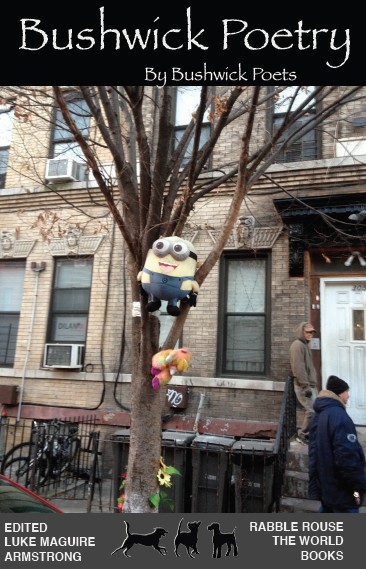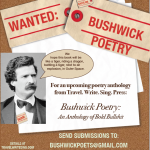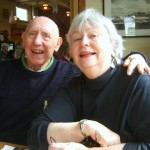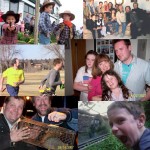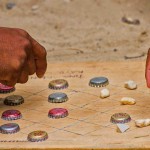Forward from Bushwick Poetry, available from Amazon.com
I know it was late because when I went inside to use the bathroom the last act of the night at The Goodbye Blue Monday was packing up their instruments. I invited the musicians to come out back and they joined our circle of patio chair.
Half of us had instruments in our hands. We were going around the circle, singing songs and reciting memorized or made-up poetry. Bushwickeans, or Bushwackers—whatever you call this undercurrent of artists around here who sway to verses, clink their $3 pints of PBR, laugh in elation, wield words like weapons, slap backs and high-fives into hands, free-style, mix poetry with music, music with art and art with life.
Nights like this abound in Bushwick. I moved to New York for the usual reasons—to pursue artistic endeavors with like minded people who never asked why you were doing what you did.
I went to the “important” Manhattan poetry events and readings, at such hold-steady places like the KGB Bar on the Lower East Side and events off Union Square sponsored by P&Ws. I enjoyed my time listening to those considered the top US poets, but that poetry often felt as static as and lifeless as Biblical texts compared to the what was happening in Bushwick.
Bushwick was the New York I came searching for—Kerouac and Ginsberg’s New York. In Bushwick they were not just reading poetry, they were living poetic lives and this shone with a different shimmer than the ivory tower keepers of verse. Here it is not uncommon to find yourself at a table consisting of sculptors, painters, performers, clowns, fire-breathers, sword swallowers, actors, film makers, and once, a guinea pig.
A half dozen PBRs deep and inhaling a communal spliff, I decided on a night late in May in the back of The Goodbye Blue Monday that I would endeavor to herd the verses of these poetic cats onto the same page and put together an anthology capturing the moment of Bushwick that I reveled in nightly.
The result is the book in your hands or on your device. I put out the word in the usual way—putting up flyers, throwing an ad in the Bushwick Daily, and putting out feelers in Bushwick’s powerful word of mouth. I had no idea what would come my way, but was not disappointed with the collection of reaching verse that accumulated in my inbox.
While these may not sing the full song of Bushwick, it certainly tells the tale of the current influx of today’s gentrification, and explores their lives and longings while putting on display the communal thread uniting this newish sect of current gentrifiers.
Bushwick has a long history of changing demographics. Ever since Peter Stuyvesant named the area Boswijck (little town in the woods) in 1661, Bushwick has been in a racial and economic flux. We humbly remind Williamsburg that it was once a part of Boswijck.
A one paragraph summery of a four hundred year history can only say that the many faces of Bushwicks past have included contested territory fought between Colonists screwing Native Americans out of their land, the 1840s and 1850s when Germans started arriving en masse, the 1890s when it became a hub of breweries, Prohibition when Bushwick underwent an economic boom (bootlegging anyone?), the 1950s when Bushwick was one of the largest Italian/American neighborhoods, the 70s, 80s and 90s when Bushwick was defined by empty lots, crime, poverty, drugs and arson.
Today Bushwick is mostly Hispanic with the cheap NYC rents that inevitably invites the surfeit of the hungry artists.
Bushwick Poetry is the communal account of bursting hearts reaching for transcendental vibes of artistic elation. These are the stories of fleeting moments, following dreams, side-walk busking, breaking and healing hearts, late night reflections in the rain, walking alone in a city of eight million people and finding community in the glances of late night subway cars.
This collection includes verse from poets like Patricia Gillespie whose poetry pokes at something familiar with potent lines that seem to alternate between hard hits and shared intimacy. Her poetry feels like a much needed sharing with a close friend during a slow brunch outside of normal New York quicktime.
“I want you to ask questions. /Questions you have answers to,” This encapsulates something timeless about our generation, of wanting tangible answers to questions, not religious dogma.
In Bushwick Poetry Erica Jane is “ Unperturbed / by the stirrings of strangers / scattered in diagonal chairs /under the eyelid of night,” and Tami O’Neil reminds us that “If ever you’re in need of someone to talk to /simply light a cigarette in front of Pennsylvania Station.”
Aaron Rush Hicks wonders if “I am the only man with no place to be?” Linda Penny claims “[she] knows you” and asks directly, “Does your hungry soul suffer so? . . . Did you feast on my fear?”
Lights on broadway seem to shout to Alan Charnock to “get out, get out of the gathering gloom.” There is a big city darkness throughout the verse, but the sort of tenebrosity that comes from seeking out, demanding brilliantly bright light.
Julianne Mason has “Quiet streets that [she] cannot cross,” and Amy Richards “tore [her] shirt into a hundred pieces / wanting to bury [her] head in it.” Together the poems relate a silver lining of hope we expect from youthful artists spending their days and nights in a city that has always enchanted and attracted such a sect.
Aebra Coe is “Smiling at the Myrtle Ave. sign, / the bodega cat,/the rainbow of shoes that cross the street” and Paul Raphaelson thinks that “You look like nice people. [He’ll] give you a lemon wedge” while Arthur Medrano still wants to believe in the tragic magic. . . from which he draws grace.

